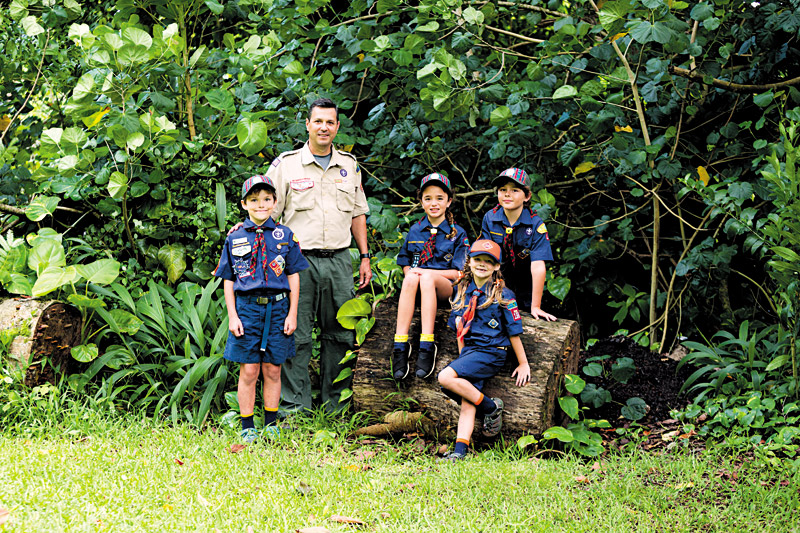Here Come The New Scouts

Aloha Council Scout executive and CEO Jeff Sulzbach is joined by Gregory Gruenthal of Pack 166, Harper Steele of Pack 1, Faith Gruenthal of Pack 166 and Scout Cash Steele of Pack 1 at a recent outing for the young Scouts.
It’s a fresh start for the century-old organization known as Boy Scouts of America, which now allows girls to participate in its flagship Scouting programs.
Boy Scouts of America announced late last year that its board of directors unanimously voted to welcome girls into its flagship Scouting programs. At the time, it seemed like a revolutionary move, but given that girls have been involved in BSA’s Exploring and Sea Scouts affiliates since 1969, the decision wasn’t so shocking, to hear Aloha Council Scout executive and CEO Jeff Sulzbach tell it.
“Having girls in the Boy Scouts of America is actually not a new thing,” Sulzbach adds.
What is different, though, is the inclusion of girls in Cub Scouts (kindergarten to age 10) and Scouts BSA (formerly known as Boy Scouts, for kids ages 11-17).
Aloha Council introduced a Cub Scout pilot program for girls from January to June, with the official start slated for the new school year. Sulzbach is quick to note, though, that neither Cub Scout dens nor Scouts BSA troops, when those roll out, will be co-ed. Rather, existing Cub Scout packs can choose to start a new girl pack, remain an all-boy pack, or create a pack that has girl and boy dens.
In this new format, girls will be able to progress alongside their boy counterparts, and even have a chance to eventually earn Scouting’s highest ranking of Eagle Scout. Merit badges, activities and curriculum will remain the same across the board, and boys and girls will have to achieve the same goals to move up the ranks.
Responses from the pilot, says Sulzbach, showed overwhelmingly positive experiences, which solidified the notion that this was a logical route for BSA to take.
“For us, both locally in our own Aloha Council, as well as nationally, there was a lot of pressure from families to have the Scouting programs available to both their daughters and their sons,” he says.
“What we experienced in our communities is that sisters would frequently participate with their brothers, especially at the Cub Scouts level,” he adds. “They come along to meetings and participate.”
Harper Steele’s induction to twin brother Cash’s Cub Scout Den 7 was par for the course, according to their mother, Jamie Simpson Steele.
“I just started bringing Harper along to Cub Scout meetings, and as she just hung out, she started to integrate with the others and started to flow into the activities,” Simpson Steele recalls. “The den leader at the time included her in everything they did.”
For Harper, she enjoys being able to do the things her brother does. So far, she’s earned eight belt loops and three patches, and hopes to earn even more in the near future.
“That was a big change,” adds Simpson Steele. “She was doing all the activities, but only the boys would get acknowledgment.”
Faith Gruenthal, 6, has always known she wanted to be a Scout.
“She’s been asking if she could be a Cub Scout since she was 3,” says mom Amanda Gruenthal.
Similar to Harper’s story, Faith tagged along when her brother, Gregory, went to his Cub Scout meetings and loved everything about them, especially roasting marshmallows, learning archery and playing gaga ball (similar to dodgeball).
The change last fall, then, felt like a natural next step for the Gruenthal family.
“She’s made a car for the pinewood derby for the past two years, and it’s really great to know that this will be an official pinewood derby for her this year,” says Amanda.
Sulzbach is proud that all of Scouting’s programs now serve both genders — from kindergarten to early adulthood — and says that change falls in line with the organization’s main goal to develop character and foster the growth of the whole person. For Cub Scouts and Scouts BSA, the merit badges, awards and accolades showcase a child’s advancement in technical skills and knowledge, but a bigger part of Scouting is its focus on giving back.
“It helps reinforce that it’s not always about us, given the ‘me’ generation we live in,” Sulzbach says. “It helps to reorient Scouts that it’s about helping other people and being a citizen in our community.
“I think people get hung up on the name change, but that’s not the most important thing,” he continues. “What’s really important is what we’re continuing to do, which is help young people develop character. It’s an exciting change, and it’s an opportunity to serve more young people and to be more responsive to what our families are saying.”
Next for the organization is its Scouts BSA rollout in 2019. One of the things the organization will be working on over the next six months is forming girl troops and coordinating to have them become chartered by sponsor organizations.
“When girls are allowed to join Scouts BSA in February, we’ve got at least one girl troop identified at every major community around the island,” says Sulzbach.
For more information or to find out how to volunteer, visit scoutinghawaii.org.




